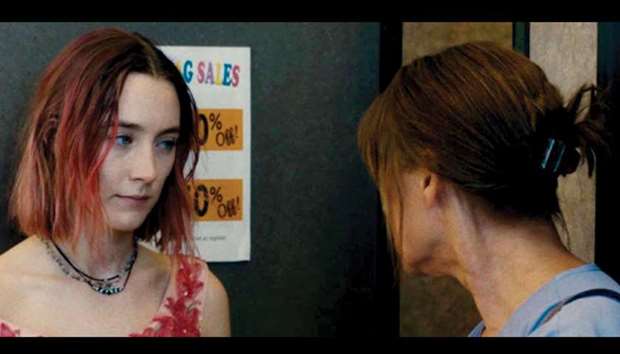Actress and writer Greta Gerwig turns in the flawless Lady Bird for her directorial debut, a funny, poignant and assured film about that fleeting, heady moment during the transition from high school to college. Anchored by stellar performances and a clear voice, Lady Bird draws its universal relatability from its richly rendered specificity.
It’s all too easy to label Lady Bird as autobiographical. But it’s more than that. Gerwig is from Sacramento, California, went to a Catholic school and attended college in New York. Her heroine, Christine, aka Lady Bird (Saorise Ronan), dreams of flying away from Sacramento — “the Midwest of California” — and landing at some East Coast liberal arts college. The film takes place in 2002 and 2003, and the era specifics embroider the details on the tapestry of time and place that Gerwig has woven — the invasion of Iraq on the news, ska music, puka shell necklaces, Bone Thugs-N-Harmony, flared jeans.
Lady Bird (the name she gave herself) is a self-consciously eccentric teen among the uniformed masses at her Catholic high school, sporting dyed pink hair, a tangle of chokers and a hot pink cast on her wrist she got hurling herself from a moving vehicle during a fight with her mom. Her studied weirdness is a result of her passionate, creative personality, her misfit status and her lower socioeconomic class — she has to shop at thrift stores so she makes quirky vintage chic her personal style.
Lady Bird is the story of a self-possessed teen going through a process of self-actualisation. She tests her wings — trying out for the musical, pursuing a relationship with a sweet theatre nerd (Lucas Hedges), then explores what it’s like to flirt with the popular crew for a while, rejecting her oddball friends, hooking up with a bad boy (Timothée Chalamet) who plays in a band, smokes hand-rolled cigarettes and reads The People’s History of the United States.
Soon she realises it’s much more fun to just be yourself. Beanie Feldstein is so endearing as Lady Bird’s spurned best friend, Jules, that you just may harbour some personal resentment at the rejection until Lady Bird finally comes around.
Although Lady Bird is marked by two significant romantic relationships, we come to realise the film is truly about the women in her life — Jules, and especially her mother, Marion (Laurie Metcalf). The arguments, silent treatments and passive aggressions between Lady Bird and her mother are all too real and all too wrenching, revealing the uncomfortable truths of the relationships between mothers and daughters, the delicate balance between expectation and disappointment. Metcalf turns in a stunning performance, communicating complex reactions in the tiniest of facial expressions. As her father, Tracy Letts is a wonderfully gentle presence.
Lady Bird is a finely wrought, deeply felt mash note to Gerwig’s hometown of Sacramento, and the rare film about teenage life that puts equal weight on the dark, sad and tough parts, as it does on the joyous, raucous, euphoric moments. It’s a film about a place, but it’s also about the way that time creates a sense of place, and how time changes your relationship to that place. The idea of “home” transforms during the moment that she depicts, that liminal space before adult life begins; from child to adult, from home to away from home. — Tribune News Service

MAKING A STATEMENT: Lady Bird is a rare film about teenage life that puts equal weight on the dark, sad and tough parts, as it does on the joyous, raucous, euphoric moments.
